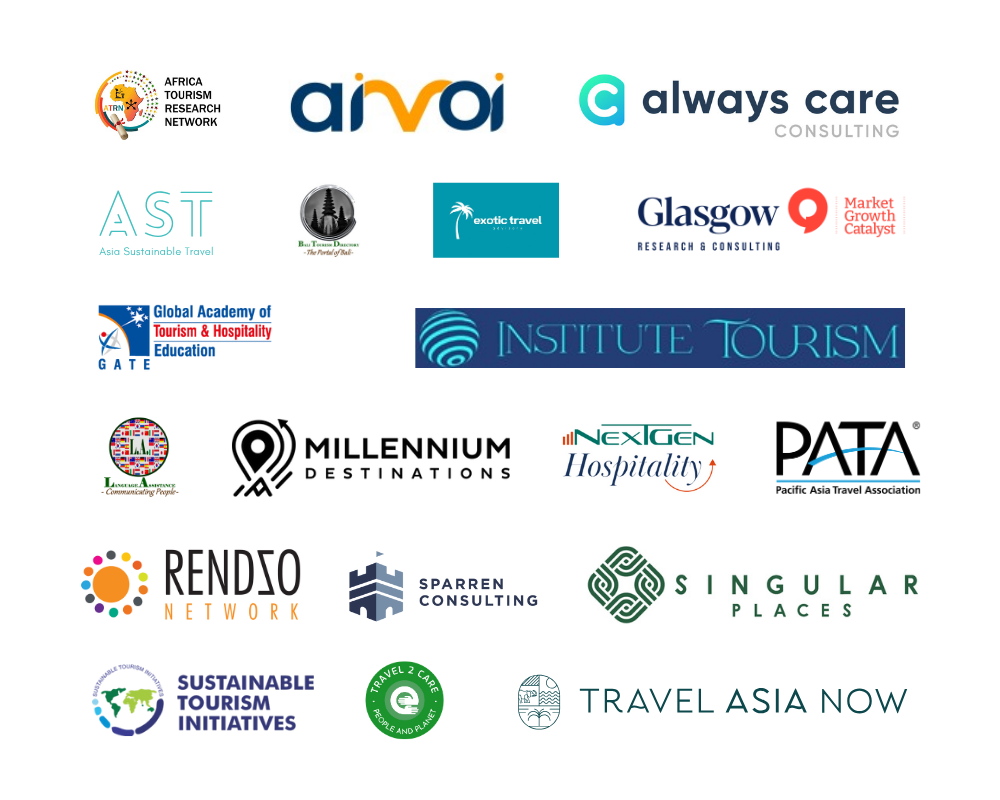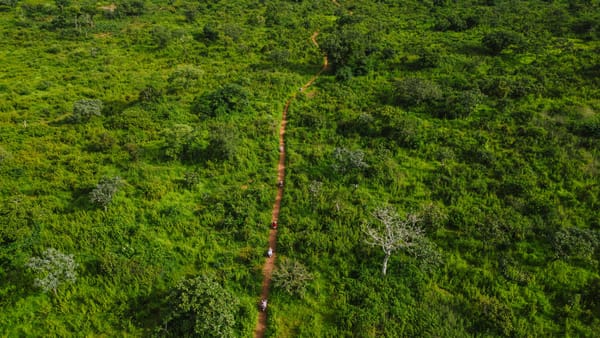Meaningful Tourism – the next step in sustainable tourism


Dear reader,
the Meaningful Tourism community is growing further and the interest in the Meaningful Tourism paradigm is increasing day by day. We are happy to welcome 12 new Certified Trainers, who successfully finished their certification training today. They are based in countries ranging from Mongolia to Sweden and will be introduced in more detail in the coming edition of the Meaningful Tourism Weekly. Almost 50 Certified trainers are now offering a deep and action-oriented introduction to the Meaningful Tourism tools for a better future of destinations, companies, and organisations in all parts of the world.
Some of our friends and partners have already suggested to start talking about a Meaningful Tourism “movement”. Maybe it is a bit too early for that; however, we are proud to learn that some tour operators have decided to put all their work under the roof of the Meaningful Tourism approach.
Also, we have the – rather dubious – honour that the first hacker found it profitable enough to connect search results for Meaningful Tourism with an erotic website, which is obviously unconnected to the MTC.
To give a clearer idea of what is in fact connected to Meaningful Tourism and what the differences to other approaches are, we are currently working on a number of publications, both for trade and for academic journals, following the article in the Bali Journal of Hospitality, Tourism and Culture Research.
For this Meaningful Tourism Weekly edition, we have already produced an infographic, comparing Meaningful Tourism with Sustainable Tourism, Responsible Tourism, and Regenerative Tourism.
All these approaches have obviously their merits, however while the word “sustainable” has been used so often that it has lost almost all specific meaning, other approaches concentrate on some elements of the tourism ecosystem, while Meaningful Tourism is based on a positive, transformative and holistic approach which we see necessary for the next step for global tourism and indeed for each service provider to survive and thrive in the fast-changing world.
We are also excited already to go to Bangkok in the coming month for the PATA Travel Mart. On August 25th, your humble editor will host an open Meaningful Tourism Transformational Game Workshop (see details in the Events section), and we now know that our MTC stand will be located close to the India and Nepal stands at D13 during the fair in the QSNCC, hopefully a lucky number.
We are still receiving positive feedback for the webinar last week organised by the Pacific Asia Travel Association (PATA). If you missed it, here is the link to the video recording.
The Meaningful Tourism Weekly team is also thankful for Mr. Omar Abi Ali’s contribution of a guest article about the work of the Shouf Biosphere Reserve in line with Meaningful Tourism.
As always, all best wishes from Prof. Dr. Wolfgang Georg Arlt and the entire Meaningful Tourism Weekly team in Kathmandu and in Manila!


Environmental Management and Community Engagement for the Shouf Biosphere Reserve: A Strategic Pathway to Achieving Sustainable Tourism in Protected Areas
By Omar Abi Ali
Using the Shouf Biosphere Reserve (SBR) in Lebanon as a case study, this text introduces innovative tools and practices that can serve as a model for other protected areas worldwide on how environmental management and community engagement can work together to achieve sustainable tourism in protected areas.
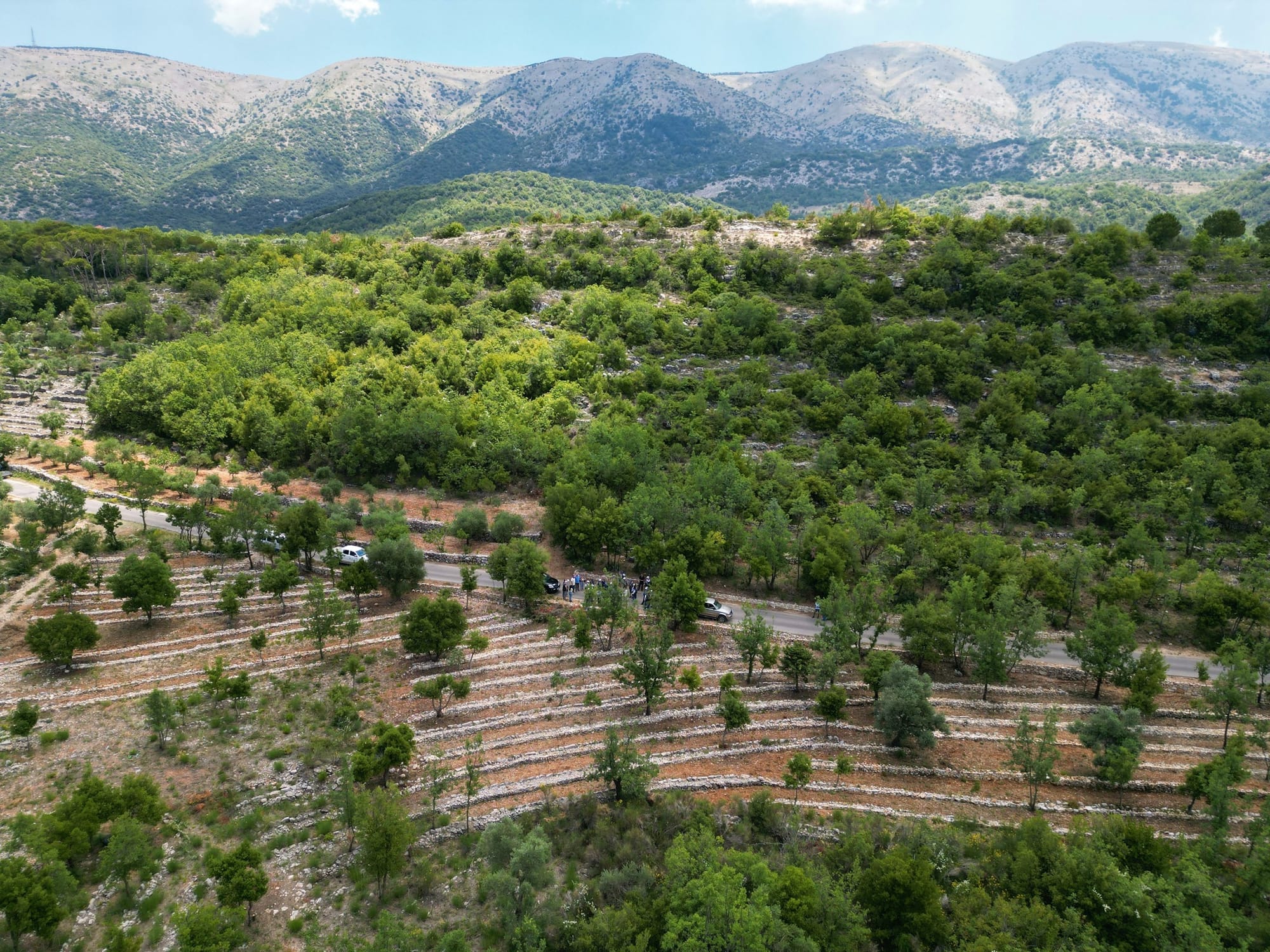
Background and Purpose
With climate change and environmental degradation threatening natural ecosystems, sustainable tourism has become a critical strategy for conservation.
Protected areas like SBR offer not only ecological protection but also opportunities for local economic development. The reserve spans 550 km² and includes Lebanon’s iconic cedar forests. It is a UNESCO-designated biosphere reserve and has been certified by the IUCN as a Green Listed site due to its high standards in conservation and governance.
To understand how local communities can be empowered to contribute to conservation through tourism and sustainable practices, we introduce the Falcon Certification System—a new tool developed as part of the research to evaluate and promote sustainability among service providers, farmers, and artisans in protected areas.
Methodology
The study conducted by Dr. Omar Abi Ali between February 2024 and June 2025 used a mixed-methods approach. Qualitative data came from interviews with SBR managers and environmental experts. Quantitative data were collected through surveys of 798 local stakeholders, including farmers, artisans, service providers, and residents. This approach provided insights into daily practices, challenges, and willingness to adopt eco-friendly behaviors.
Participants showed high levels of satisfaction with the reserve’s initiatives, and the majority reported active involvement in conservation activities such as tree planting, terrace restoration, and composting. Around 80% expressed a willingness to pay environmental taxes or volunteer to support conservation efforts.
Key Findings
The research highlights how SBR balances conservation with tourism through zoning policies. The core zone is protected for hiking only, while eco-tourism businesses operate in the development zone. This strategy limits the impact on biodiversity while creating jobs and revenue for locals.
Economic benefits were a major factor in community support. Farmers and artisans reported better market access and increased income due to eco-tourism. Cash-for-work programs and training initiatives helped residents develop sustainable practices and feel ownership over the reserve’s success.
Falcon Certification System
One of the most innovative contributions of this study is the Falcon Certification System. Unlike other evaluation tools (such as IUCN Green List, IMET, and METT), Falcon is designed specifically to integrate sustainable tourism with conservation. It is based on five core components:
- Sustainable Tourism Practices
- Community Engagement and Capacity Building
- Environmental and Resource Management
- Accountability and Monitoring
- Willingness to Support Conservation
The certification evaluates service providers based on 12 criteria and 24 indicators. It rewards those who meet sustainability standards, offers training, and provides a roadmap for improvement. Service providers who achieve certification gain recognition, attract environmentally conscious tourists, and receive ongoing support.
Recommendations
As a result of the project, the study proposes to launch an SBR Academy to provide training programs for local businesses seeking Falcon Certification. These programs would promote eco-friendly practices, sustainable resource use, and Responsible and Meaningful Tourism. They would also create new revenue streams for the reserve and its partners.
In addition, the study recommends continued investment in biodiversity monitoring, eco-infrastructure, and tools like Falcon to strengthen conservation outcomes and community livelihoods.
Conclusion
The Shouf Biosphere Reserve is a successful example of how environmental protection and local development can work hand in hand. The Falcon Certification System adds a practical framework for ensuring that tourism supports conservation rather than threatening it. By aligning local efforts with global sustainability goals, SBR demonstrates a scalable, community-based model for sustainable tourism in protected areas.
Omar Abi Ali has been the DMO Manager and Eco-Tourism Coordinator of the Shouf Biosphere Reserve since 2017.

A different tourism conference
Based on a text by Michelle Holliday, Author of The Age of Thrivability: Vital Perspectives and Practices for a Better World
The Tourism Industry Association of the Yukon this year dared to do a very different kind of annual tourism conference, inviting a new kind of conversation—one that asks us to look at tourism, community, and the future itself through a regenerative lens: a future where life thrives, not just business.
The invitation to the conference already showed that this will not be the usual set of presentations and panels: “This year’s gathering will explore how hosting—in the broadest sense—shapes community resilience, well-being, and our shared future. In this context, hosting goes beyond tourism to include the way we welcome, nourish, and sustain each other, our land, and new possibilities. Together, we’ll reimagine tourism not just as an industry—but as a way to host and sustain a future we all want to be part of.”
The conference was held at Haa Shagóon Hídi, a First Nation cultural center. It started with a large standing circle around the outdoor fire pit, guided in a ceremonial welcome by a First Nation member. Drumming activities, massage and reflexology treatments were available throughout the whole conference.

All these arrangements helped create the conditions for people not only to look at their own work, not only to consider their own experiences and interests, but also to take in what was happening around them.
The conference conveyed the message that what needs to be healed is people and place. It is us, our societies, and our natural ecosystems. And this isn’t the tourist’s responsibility, or even possibility, to heal us. Instead, it’s something the host community must take on together at local levels as a community that has the commitment and capacity to regenerate itself continuously.
People who work in tourism are uniquely positioned to play this role. Their work is connected to everything in a community—to commerce, culture, history, infrastructure, government, and more. What they do is grounded in things all residents care about in their shared home. How many sectors can claim all of these things?
A result of the conference was the insight that for the work of “hosting the hosts”, it is essential to go beyond the survey, beyond consultation, beyond simply asking peers and residents: “What do you want tourism to do for you?”
To support new projects and new possibilities that enable ongoing, unfolding healing of people and place, it needs a full “hosting ecology.” Taking such a holistic view means that we’re aiming for more benefit for more of the system.
At the conference, participants were invited to imagine together what a regenerative hosting ecology in the Yukon might look like – and what it might require, distributed on sixteen tables of five or six people each with a flip chart to make notes from their conversation, which lasted for 45 minutes, with short shared reports to the whole group afterwards.


In a nutshell, the need for connection turned out to be the strongest theme throughout the two days as well as in this exercise, including more partnership with First Nations, within the broader community and with visitors (“for example: educating them about how to care for this place”), embedded in a network.
No single group at a table came up with the whole picture of the hosting ecology; however, by putting all 16 of them together, a clear, cohesive vision and mandate emerged.
In that vision of the future, people and businesses are “each stronger with others,” “nourished by real connections with ourselves, visitors, and community.” As hosts, people are “able to be authentic, not prescribed,” even as they have “a sense of shared identity.”
Such a vision of a new level of Hospitality will help visitors to feel the connection, the “Spell of the Yukon”, making them stay longer.
Note: All photos from Michelle Holliday's article

Meet the Trainer for the Meaningful Tourism Transformative Game Workshop

Samuel Lupeska is an agribusiness and sustainability professional with years of experience in multi-stakeholder project management, community-driven solutions, and measurable impact frameworks. He is currently serving as Project Manager at the Centre for Conflict Management and Women Development Affairs (CECOWDA), leading a GEF-funded initiative aimed at improving community-based waste management in Blantyre, Malawi.
He is an expert in aligning objectives across visitors, communities, employees, businesses, governments, and environmental stakeholders to advance holistic sustainable development. He holds a Bachelor of Science in Agribusiness Management from Lilongwe University of Agriculture and Natural Resources (LUANAR). He has a proven ability to design and facilitate transformational workshops, develop SMART KPIs, and implement scalable strategies for climate-resilient systems. He is also adept at leveraging game-based learning methodologies to foster collaboration and sustainable innovation in tourism, agriculture, and waste management.

The Meaningful Tourism Weekly asked Samuel: What is the current situation of tourism in Malawi, and how can the Meaningful Tourism Paradigm help to support its development?
His answers:
Current Tourism Situation in Malawi
• Infrastructure & Accessibility: Underdeveloped airports, poor roads to key sites (e.g., Mulanje Mountain), and unreliable utilities deter high-value tourists.
• Economic Leakage: Revenue is lost through overseas payments for local services and inflated pricing that sidelines domestic tourists.
• Stakeholder Misalignment: Communities near parks face hostility toward conservation efforts, while poaching threatens wildlife. Service inconsistencies from airports to lodges undermine Malawi’s brand.
• Policy Execution: Despite robust frameworks (e.g., MW2063 vision, National Tourism Policy), implementation lags due to fragmented coordination across ministries and weak enforcement.
How Meaningful Tourism Can Catalyze Change
• Visitors: Develop SMART KPIs for visitor satisfaction (e.g., service quality, safety), reducing harassment, and ensuring pricing transparency.
• Host Communities: Integrate communities into tourism value chains (e.g., cultural tourism, crafts) using MT’s role-play workshops to foster ownership. Example: Train communities near Majete Wildlife Reserve to view wildlife as economic assets (" This elephant funds our school ").
• Environment: Enforce eco-certifications for lakeside hotels to prevent pollution, aligning with Malawi’s climate resilience goals.
• Businesses and Employees: Advocate for tax reforms to lower operational costs and incentivize local sourcing (e.g., textiles for lodges), boosting affordability.
• Government: Streamline inter-ministerial coordination (e.g., Tourism, Transport, Finance) via MT’s "alignment over compromise" approach to accelerate infrastructure projects.
• Global Partnerships: Leverage MT’s network to attract sustainable investments (e.g., cable cars on Mulanje Mountain) and share best practices (e.g., Rwanda’s community-led gorilla tourism).
The Path Forward
Malawi’s MW2063 vision positions tourism as a pillar for inclusive wealth. By adopting MT’s transformational workshops, Malawi can:
• Turn ‘stakeholder conflicts’ into shared-value strategies (e.g., community-ranger partnerships against poaching).
• Embed measurable KPIs across all sectors (e.g., tourist spending retention, community revenue shares).
• Amplify its unique selling proposition: authentic warmth + untouched natural beauty.


What’s the difference between Meaningful Tourism and other approaches?
As mentioned in this week’s editorial above, MTC is proud to present you an infographic, produced by the TAN team in Manila, which provides a quick overview of key elements of Meaningful Tourism in comparison to Sustainable Tourism, Responsible Tourism, and Regenerative Tourism.
At the bottom of the graph, you will find the relevant sources for the content of the graph.
If any of our readers has proposals on how to improve the information about the other forms of tourism, we are happy to receive any feedback. Meaningful Tourism is not developed as a competitor to other approaches, but rather as a further necessary step, based on the experiences of the last decades, and as a tool to survive the challenges ahead.
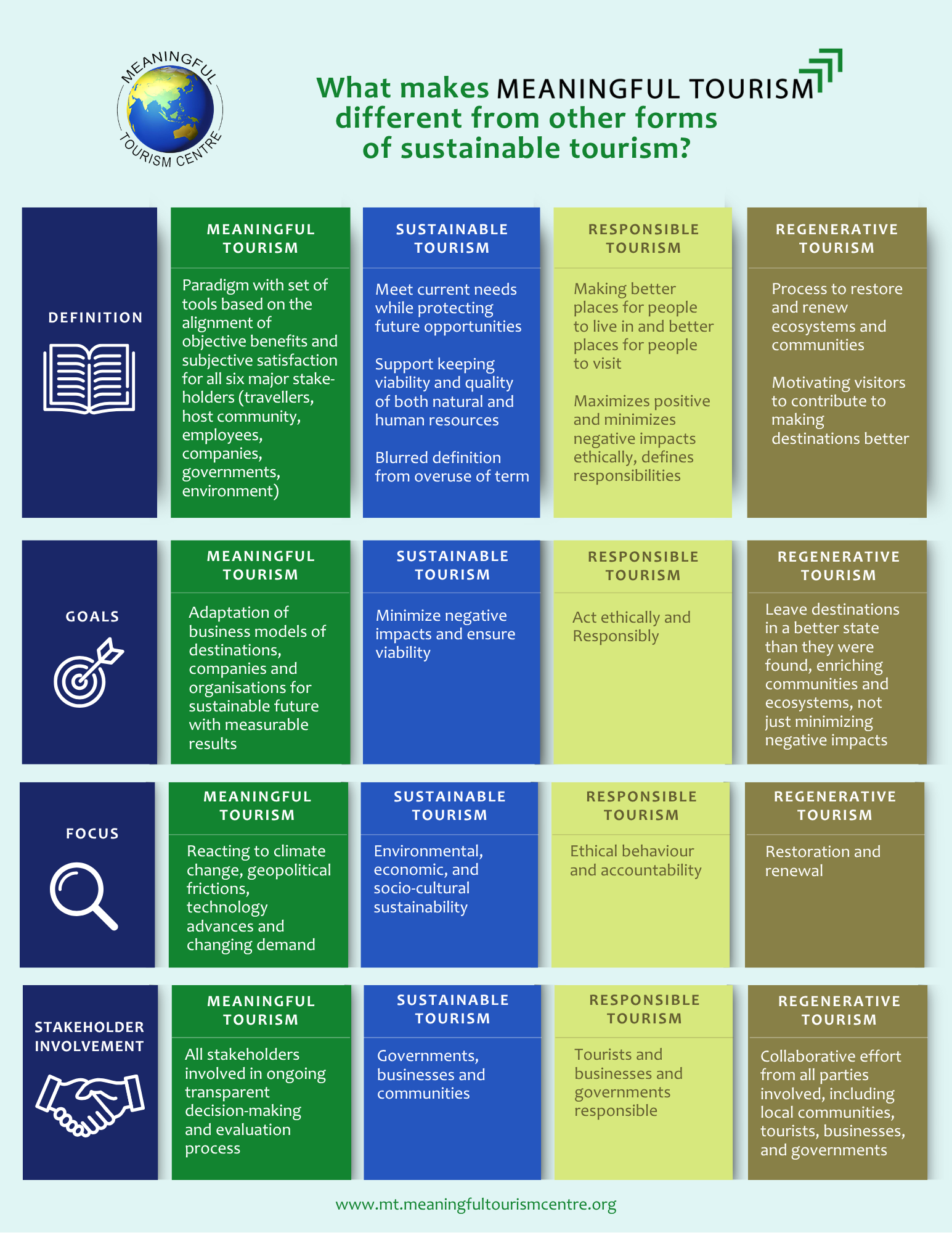
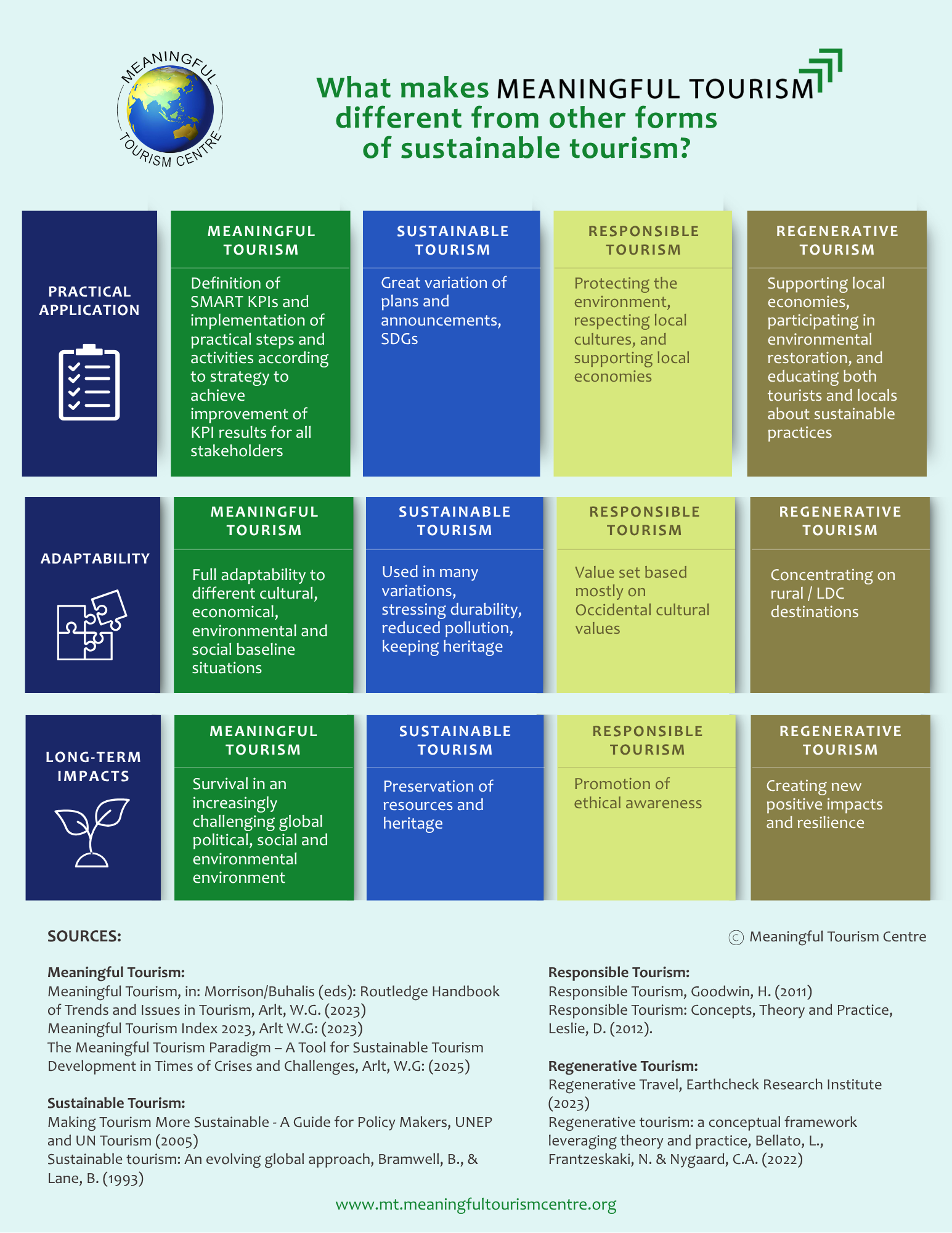
Meaningful Tourism Expert Skills and Experiences Matrix

Last week, we introduced the Meaningful Tourism Expert Skills and Experiences Matrix which provides information about the wide range of skills and experiences that can be used for the Implementation Support of Meaningful Tourism strategies in many different forms.
Based on your feedback, we have updated the Matrix to make it easier to use. In the coming week, we will add the new group of trainers who have been certified today. Therefore, another update is just around the corner.
You can find the Matrix on our website.
Nevertheless, even with the addition of new Certified Trainers, MTC continues to look for professionals who have experience in conducting training or lecturing and share a passion for sustainable tourism.
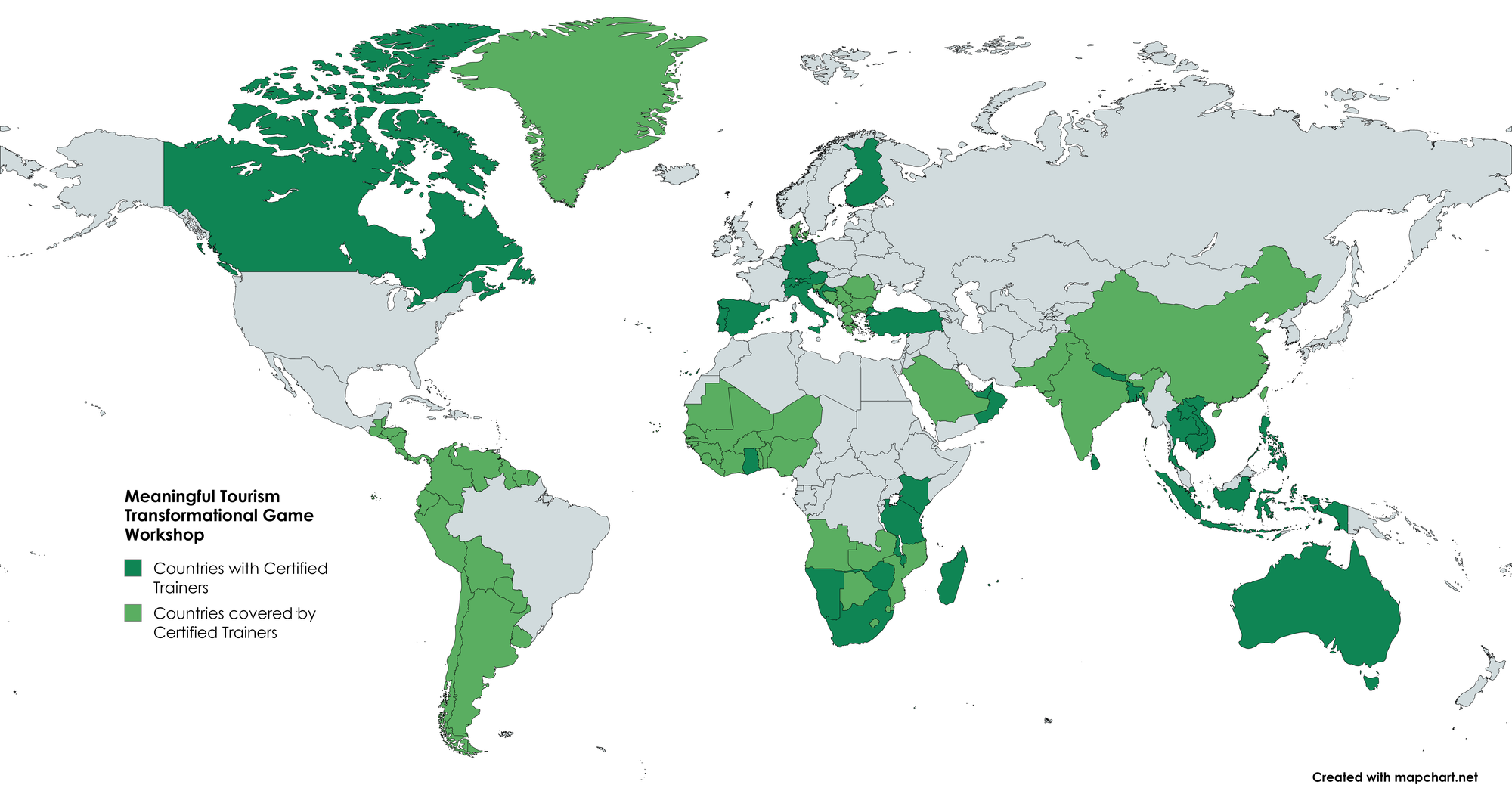
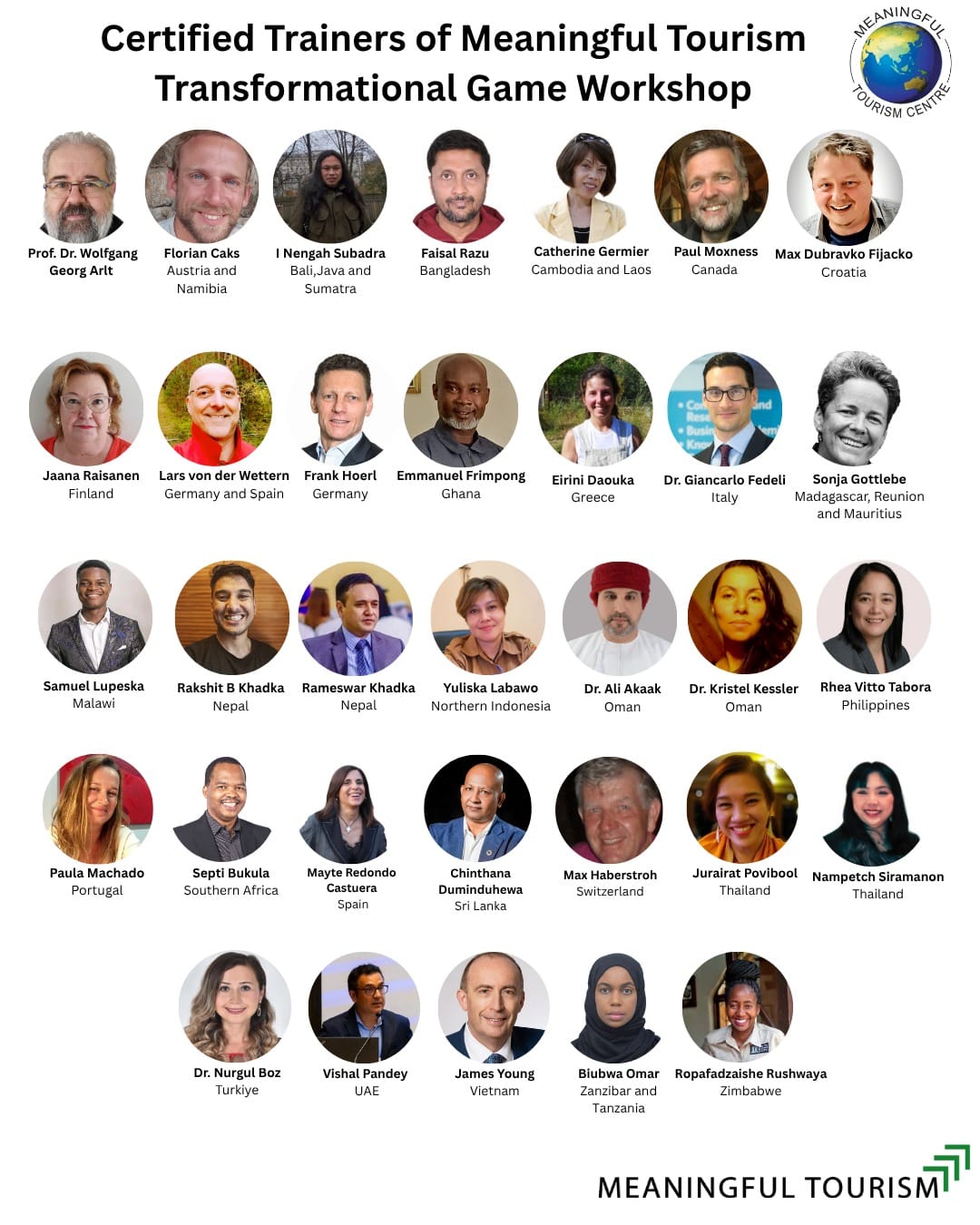

Meaningful Tourism Weekly Video of the week: Empowering the workforce
The benefits and satisfaction of the employees of tourism service providers in tourism and hospitality are one of the often overlooked aspects in discussions about sustainable tourism.
In the Meaningful Tourism paradigm, employees are treated as one of the six main stakeholders.
The World Sustainable Hospitality Alliance showcases the success of the “Egypt Employability Programme” in a video on the occasion of World Youth Skills Day.
JW Marriott Hotel, Cairo, IHG Hotels & Resorts, and Le Méridien Cairo Airport provided structured, inclusive training that can help fill labour gaps, improve retention, and build stronger, more diverse teams.
For many of the young people taking part—over 70% of whom are women—this programme is more than a pathway to employment. It opens doors to independence, confidence, and long-term opportunity, one step towards playing a part in a Meaningful Tourism Economy.
Post-human tourism
COTRI Weekly, the sister publication of the Meaningful Tourism Weekly which concentrates on China’s outbound tourism, this week features discussions among Chinese scientists that go beyond the use of AI and robots replacing the human workforce in tourism. They are seeing on the horizon customised intelligent robots which could fulfil family roles, such as that of a partner or child, forming new family structures consisting of “human-machine combinations”.
In this sense, AI could replace human roles to varying degrees. According to one leading expert on demography, “the coexistence of humans and intelligent machines could transform human social relations”. With half of young urban women in China, who almost all grew up as a single child, stating that they do not plan to get married or have children, this sounds less crazy in China than maybe in other countries.
Which leads to the question: When will the first robot spouses start to travel with their human partners, and what will that mean for Meaningful Tourism?


Meaningful Tourism Transformational Game Workshop at PATA Travel Mart, Bangkok
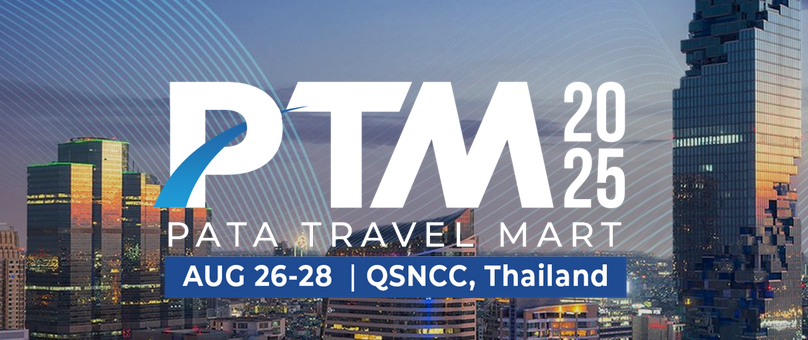
PATA Travel Mart (PTM) is one of Asia Pacific’s longest-standing international travel trade exhibitions featuring networking and contracting opportunities to help travel and tourism organisations access decision-makers, meet new clients, expand their networks, establish new relationships, and consolidate existing business partnerships.
PTM will take place at Queen Sirikit National Convention Center (QSNCC) in Bangkok, Thailand, from August 26 to 28, 2025.
On August 26, one of the conference topics will be Meaningful Tourism and the way to a Meaningful Pacific-Asia Tourism Economy, as outlined in the PATA Vision statement. For details on how to participate, please visit PATA Travel Mart 2025.
The Meaningful Tourism Centre will host a special Meaningful Tourism Transformational Game Workshop on August 25, 2025, the day before the PTM 2025 begins. The workshop will run from 9:00 to 16:00 h and will be conducted by Prof. Dr. Wolfgang Georg Arlt FRGS FRAS, founder of the Meaningful Tourism Centre, together with the Meaningful Tourism trainer for Thailand.
There are only 30 seats available, so if you already know that you will attend PTM 2025, please ensure you arrange your schedule to arrive on time for the training workshop on Monday, August 25th. Book your seat now and enjoy the Early Bird fee. Venue: QSNCC Bangkok, details to be advised. Transport from/to the hotel or QSNCC can be arranged on request at a special rate.
Early Bird participation fee for bookings paid before August 15, 2025: USD 175 per person
Full participation fee for bookings after August 15, 2025: USD 200 per person
VAT included if applicable.
PATA members (including PATA chapter members) enjoy a 15% discount.
Two or more seats booked at the same time enjoy an additional 10% discount.
Please note that payments are non-refundable. However, a change of participant is possible without additional fee until one day before the training workshop.
The participation fee includes training workshop participation, a certificate of participation, one year of free access to all content, including the Meaningful Tourism Weekly Library reserved for paid subscription holders, coffee/tea, cookies, and a vegetarian and non-vegetarian lunch buffet.
For bookings, please contact us at office@meaningfultourismcentre.org.
Bookings will be closed once 30 reservations have been reached. Book today and enjoy the Early Bird fee.
Meaningful Tourism Transformational Game Workshop at World Travel Market, London
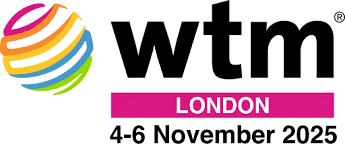
World Travel Market (WTM) in London is one of the must-attend annual events for key players in the tourism industry. The Meaningful Tourism Centre will offer a special Meaningful Tourism Transformational Game Workshop on the day before the start of WTM 2025, on November 3, 2025, from 9:00 to 16:00 hours. The workshop will be conducted by Prof. Dr. Wolfgang Georg Arlt FRGS FRAS, the founder of the Meaningful Tourism Centre.
There are only 30 seats available, so if you already know that you will attend WTM 2025, make sure you arrange your schedule to arrive on time for the training workshop on Monday, November 3, 2025.
Book your seat now to enjoy the Early Bird fee.
Venue: Central London, details to be advised. Transport from/to the hotel or Excel London can be arranged on request at a special rate.
Early Bird participation fee for bookings paid before September 30, 2025: 175 Euros per person
Full participation fee for bookings starting October 1, 2025: 200 Euros per person
VAT included if applicable.
Two or more seats booked at the same time enjoy an additional 10% discount.
Please note that payments are non-refundable. However, a change of participant is possible without additional fee until one day before the training workshop.
The participation fee includes training workshop participation, a certificate of participation, one year of free access to all content including the Meaningful Tourism Weekly Library reserved for paid subscription holders, coffee/tea, cookies, and a vegetarian and non-vegetarian lunch buffet.
On the evening of November 3, 2025, there will also be a (self-paid) dinner followed by drinks with an opportunity to network with participants and to meet several of the Meaningful Tourism trainers from different countries.
For bookings, please contact office@meaningfultourismcentre.org.
Bookings will be closed once 30 reservations have been reached. Book today and enjoy the Early Bird fee.
About Meaningful Tourism Weekly
Meaningful Tourism Weekly, published every Thursday by Meaningful Tourism Centre (MTC) - London and Kathmandu, recently partnered with Travel Asia Now, led by Rhea Vitto Tabora. This collaboration enhances the newsletter’s professional production and distribution, bringing added value to our readers.
Each issue features the Meaningful Tourism Weekly Editorial, updates on MTC activities, a Best Practice Example, a portrait of an MTC-certified trainer, news about upcoming events, and occasionally additional op-ed pieces from guest authors. Carefully selected news items, including videos and podcasts, are also included, along with links to their original sources in the Meaningful Tourism News section.
Subscription to Meaningful Tourism Weekly is free, with the addition of a paid content section that includes a library of surveys, exclusive articles, conference presentations, and statistical data, offering subscribers invaluable resources.
Sponsorship opportunities are available for those interested in supporting this initiative.
For more information about MTC's trainings, market research, product adaptation, consulting services, conferences, strategy development, and marketing, visit our website or email us at info@meaningfultourismcentre.org.

